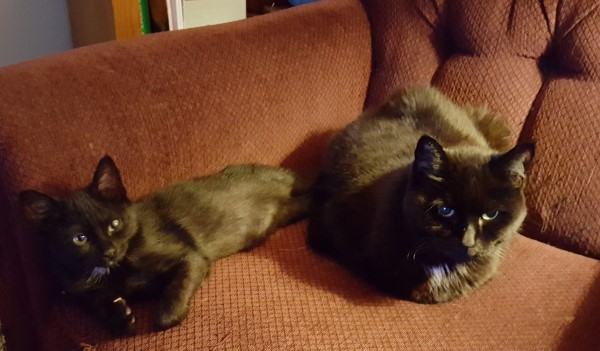
Maternal Aggression in New Mother Cats
Do you have a cat who is a new mother to some cute kittens?
Is she acting a little strange?
Of course she is. If it was you, wouldn’t you be acting a little strange?
Maternal Aggression in Queen Cats
Queen cats, which seems like a fitting term for these females, often become protective after giving birth.
Many times, their protectiveness crosses the line into being aggressive.
They might display this aggressiveness at everyone but their kittens. That includes you, other humans, and any other pets in your household.
This defensiveness is natural. It’s in their DNA. It comes from survival hormones that were developed out in the wild.
Why is My New Mother Cat So Aggressive to Me?
New mother cats are surging with hormones and she’s just days removed from the confusing and intense discomfort of delivering a litter of little cats.
She is still confused and not feeling one hundred percent. But her instincts are telling her one thing — protect those kittens from everyone and everything.
She may or may not be aggressive towards you. It’s natural and it will pass. Don’t take it personally.
What About the Dad Cat? Will She Be Aggressive to Him?
As much as we would like to think that the father of these kittens has some kind of affection for this group and wants to get in on the parenting — he doesn’t.
The queen knows this. It’s all up to her and she isn’t going to let any other cat get involved because she can’t trust them.
Common Behavior Traits of New Mother Cats
A new queen will often display certain behaviors.
Here are some common actions you might notice, they are normal for a new mother.
She Has No Tolerance for Other Cats
During the first few weeks after giving birth, she may not want any other cat sniffing around her babies. She may growl and hiss and swipe at any cat, even if that cat was previously her best friend.
She Might Not Want You Around Them Either
It might take a couple of weeks before she will agree to you touching her babies. Her hormones are still raging and she may be confused about whether or not you are a threat to those kittens. So just respect her wishes. She will return to her normal self soon enough.
She is Now a Teacher
The momma cat’s job is to teach and socialize her kittens. She will groom them and nudge them around. But she may also discipline them too. That’s how they learn what is acceptable and safe and what isn’t.
She Will Communicate With Them Vocally
It doesn’t take long before kittens wander away from the mother. They are curious about their environment. The momma will often meow in an effort to call them back, or at least remind them of where she is.
She May Move Them Around
You may have set up a great, comfortable area for her and her kittens only to see one morning that she has moved her family to a different spot during the night. A group of kittens produces a scent that can be noticed by a wild animal. Out in the wild, the momma cat knows this and may think it is safer to move to a new nesting spot every day or every other day. Your cat may have this urge too, even though she is perfectly safe in your home. If she wants to change sleeping spots, just let her.
If your new mother is exhibiting these types of behaviors, don’t worry about it.
These protective feelings are the strongest in the first three or four weeks following the birth of the kittens. This is also the time that those kittens are at their most vulnerable stage.
Maternal Behavior Problems in Cats
There are four typical behavior problems on the new kitty mom spectrum.
The first is some cats display some aggressive maternal instincts which cause problems.
The second behavior problem is the new mom that shows a complete lack of compassion or caring for her new brood.
The third problem is when the mother develops abnormal traits that places
her kittens in danger.
And the final problem is excessive maternal instincts which is when a female has not actually given birth, but is confused and thinks that she has.
Aggressive Behavior Problems
This is the most common issue people see with their new queens.
When a cat has kittens, the mother will naturally and instinctively know what to do and care for her kittens.
Sometimes she will be overly protective in the first three or four weeks. This can lead to her hissing, growling, and lashing out at humans and other pets in the home.
It’s a little disturbing to the owner who just wants to comfort the new mom and her kittens but feels shut out.
Just hang in there and your relationship will get back to normal soon.
Lack of Maternal Behavior
Some moms have a lack of maternal behavior — they don’t know what to do or maybe don’t even care.
They don’t have that natural instinct necessary to take care of the litter. Whatever this instinctive trait is, they are deficient in it.
This is a serious situation. Here is what to look for:
- She seems to have abandoned her litter
- She will not nurse them
- She doesn’t seem to care for them at all
- She doesn’t lick and clean them
- She lets them walk away when they are just days old
- She carries them around too much and seems confused
- She gets too aggressive with them
A well-adjusted queen knows how to take care of her litter. She generally doesn’t need our help.
But if your cat isn’t adjusting well during that first day or two, you will have to step in and take charge.
Highly Abnormal Maternal Behavior
Once in a while, a new queen may have experienced tremendous hormonal changes or is dealing with a lot of stress or feels threatened.
This can lead her to endanger the lives of her litter. She is confused. She may take her new aggression and fear caused by people or other animals and redirect it at her kittens.
She may attack her kittens. She is dangerous to them.
If you notice any behavior like this, you will need to separate the kittens from their mom in order to protect them.
Excessive Maternal Behavior
This behavior is when a female cat is experiencing a false pregnancy.
She thinks she is a new mom, but she was not pregnant and has not given birth.
And no, this is not a rare occurrence. It’s a hormonal imbalance that makes her act like a new mother.
If there are kittens nearby, she may actually steal one, thinking that it is hers.
She may mother or attempt to nurse an object, often a stuffed toy, that is the same size as a kitten.
She might even start lactating.
This problem goes away after a few weeks and her hormones come back into alignment.
Strange Behavior in New Cat Mothers
When our cat has kittens, it can be an exciting time for us.
These biological events, however, are confusing, uncomfortable, and terrifying for the mother cat.
Her physical and mental state changes for a couple of months. She is going to act differently.
She is going to be protective, probably over-protective, of her litter for several weeks.
She will be hypersensitive to potential threats. That includes anything unfamiliar to her.
She may even be aggressive and unapproachable for a while.
These biological forces produce short-term behavioral changes, but as the weeks go by and the kittens get older, these traits will disappear.
It’s during the first three to four weeks when those kittens are so vulnerable and need to be looked after, that the mom’s behavioral changes are most acute.
Maternal Behavior Issues and What To Do About It
So you have a litter of kittens in your house, how can you help your queen?
You mostly just need to be attentive and supportive.
Tips On How To Help Your New Mother Cat
Be Hands-Off Unless You Have to Step In
Your momma cat is usually capable of doing all the work, you just need to supervise and make sure everything seems okay.
If something doesn’t seem right, especially during those first few days, you will need to step in and take charge.
What you need to watch for initially is to make sure that her reaction and behavior to her kittens are compassionate and motherly. If she is ignoring them or too aggressive to them, you may have to intervene.
Give Them a Great Nesting Spot
You want to provide her with a quiet and safe spot for her to care for her new brood.
You want her to feel as little stress as possible from outside forces. You want her to feel comfortable and safe from other cats or pets.
In fact, you may want to give her more than one option, because it’s common for moms to move their kittens from one spot to another.
Give Her Everything She Needs
Make sure that she has food and water and her own litterbox very close by.
She won’t have to worry about traveling downstairs to get to the litterbox or running into another cat along the way.
Make her area totally self-contained so she doesn’t have to leave it for any reason.
Keep Your Other Cat Away
This might be difficult to do but keep your other cat away from the new mom.
Obviously, your other pets are going to be very curious as to what is going on in the other room, but your new mother is going to be overly protective of those kittens and she doesn’t want any other pet snooping around.
Protect the Kittens From Wandering Off
A low gate set up in a doorway is a great way to allow a mom to leave the room for a minute if she wants to.
And it will still be high enough to prevent her kittens from wandering away.
If you have other pets, a low gate is not an option. You may have to keep a door closed for a couple of weeks.
Be sure to check on them often and make sure one hasn’t gotten himself into some type of trouble.
Don’t Freak Out
Your mother will probably become more vocal than she usually is. She will be communicating with her new kittens.
She will be cleaning them, nursing them, taking care of them, and socializing them. Some behavior might seem a little rough, but it is probably natural and okay.
If she shows unusual aggression to one or more kittens and you are worried about their health, you might need to separate them and begin hand nursing and cleaning them yourself.
She will be more defensive than usual. Don’t take it personally. It’s just instincts and hormones. She will turn back to her normal self in a few weeks.
Resist the Urge to Pick Them Up
During the first few days, your queen probably doesn’t want anyone touching her babies.
Even though she loves you, she might not appreciate your interruption. Try to avoid handling them too much at first.
And the mother may not want to be picked up during this time as well. Give her time to heal and return to normal.
It will be important for you to socialize your new kittens after a while so they become unafraid of people.
If your queen is still overly protective, you may have to lure her out of the room with treats or food so you can bond with her kittens.
What Happens Next?
As the weeks go by, your new mother’s hormones start to go back to normal.
She is feeling better and more like her old self. She is nice to you again.
Your kittens are older and stronger. They are weaned. They don’t need constant attention. They are pretty cute and awesome.
Now you just have to figure out what you are going to do with all these little cats….
NOTE: This article (and any other article on this site) is not written or intended to be pet medical or pet healthcare advice. Do not rely on this article to be professional or veterinarian advice. The authors of these articles are not doctors, nor are they veterinarians. This article is to be regarded as general information only. The only pet health advice you should depend on for your situation is the guidance you receive from your own vet, doctor, and staff you have contact with within your city. Please phone your vet with any concern you have with your cat.




